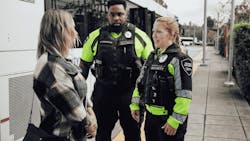CATS, Community Transit update safety guidelines
The Charlotte Area Transit System (CATS) and Community Transit are making improvements to their systems to increase rider safety.
CATS to utilize new safety tools to protect riders
New safety tools will allow professional security services (PSS) officers to utilize bike and utility terrain vehicles (UTV) to patrol along CATS’ Blue Line. According to CATS, PSS officers will continue to coordinate with the Charlotte-Mecklenburg Police Department and other city departments to ensure the safety of all passengers and employees.
“Safety is the foundation of everything we do as a city,” said Charlotte Mayor Vi Lyles. “By working together across departments and with our community, we are committed to implementing these new measures to ensure Charlotte remains a safe and thriving place for all.”
CATS notes the use of UTVs and bike patrols expands coverage, enhances fare evasion checks, improves response times in emergencies and increases visible security presence systemwide.
“The addition of bike and UTV patrols is a critical step in our mission to increase safety and reliability in our transit system,” said CATS Interim CEO Brent Cagle. “We believe these patrols will not only increase visibility, but also foster a greater sense of security for our riders.”
According to CATS, riders can continue to support safety efforts through the See Something, Say Something initiative. Security officers are available at any time, and riders can also use the blue light emergency call buttons along the Blue Line.
CATS notes the CATS-Pass app provides a direct connection to the safety and security team by allowing riders to tap the report a problem to CATS button on the main screen.
Community Transit updates Rules of Conduct
The Community Transit Board has approved an updated Rules of Conduct. The new rules, set to be implemented on Nov. 1, include:
- Assurances that individuals are provided proper notice, an opportunity to comply and clear information about how to appeal exclusions.
- Allowances for the agency’s embedded social workers to request that an exclusion be suspended for a client they’re actively working with.
- Clarification regarding when warnings, temporary denial of service or exclusions are appropriate.
- Documentation of expectations around enforcement actions to ensure consistent data tracking and analysis across the system.
- Updates to the exclusion matrix, which ensures enforcement steps are progressive and proportionate, including new classification levels for specific offenses.
- Another notable change is that the Rules of Conduct also apply to the agency’s Zip Shuttle services, which now operate in Arlington, Darrington, Lake Stevens and Lynnwood, Wash.
Community Transit adopted the Rules of Conduct in 2022 to better respond to nationwide concerns about safety that arose during the COVID-19 pandemic. The agency also invested in a Transit Security Officer (TSO) program that launched in 2023 and is on track to have a total of 35 officers by the end of 2025. According to the agency, TSOs have been successful at reducing the number of incidents that require responses by the agency’s Transit Police Unit, a contracted unit of the Snohomish County Sheriff’s Office.
In July 2024, the agency established a Security Operations Center, which is staffed seven days a week from 5 a.m. to midnight. Community Transit says a new phone number for reporting incidents has been publicized, and riders will soon also have the option to text safety concerns.
“The Rules of Conduct are foundational to Community Transit’s commitment to a culture of safety and security for all employees and customers,” said Community Transit CEO Ric Ilgenfritz. “The revisions are based on learnings from interactions with employees and are in compliance with state and federal laws.”
About the Author
Brandon Lewis
Associate Editor
Brandon Lewis is a recent graduate of Kent State University with a bachelor’s degree in journalism. Lewis is a former freelance editorial assistant at Vehicle Service Pros in Endeavor Business Media’s Vehicle Repair Group. Lewis brings his knowledge of web managing, copyediting and SEO practices to Mass Transit magazine as an associate editor. He is also a co-host of the Infrastructure Technology Podcast.

